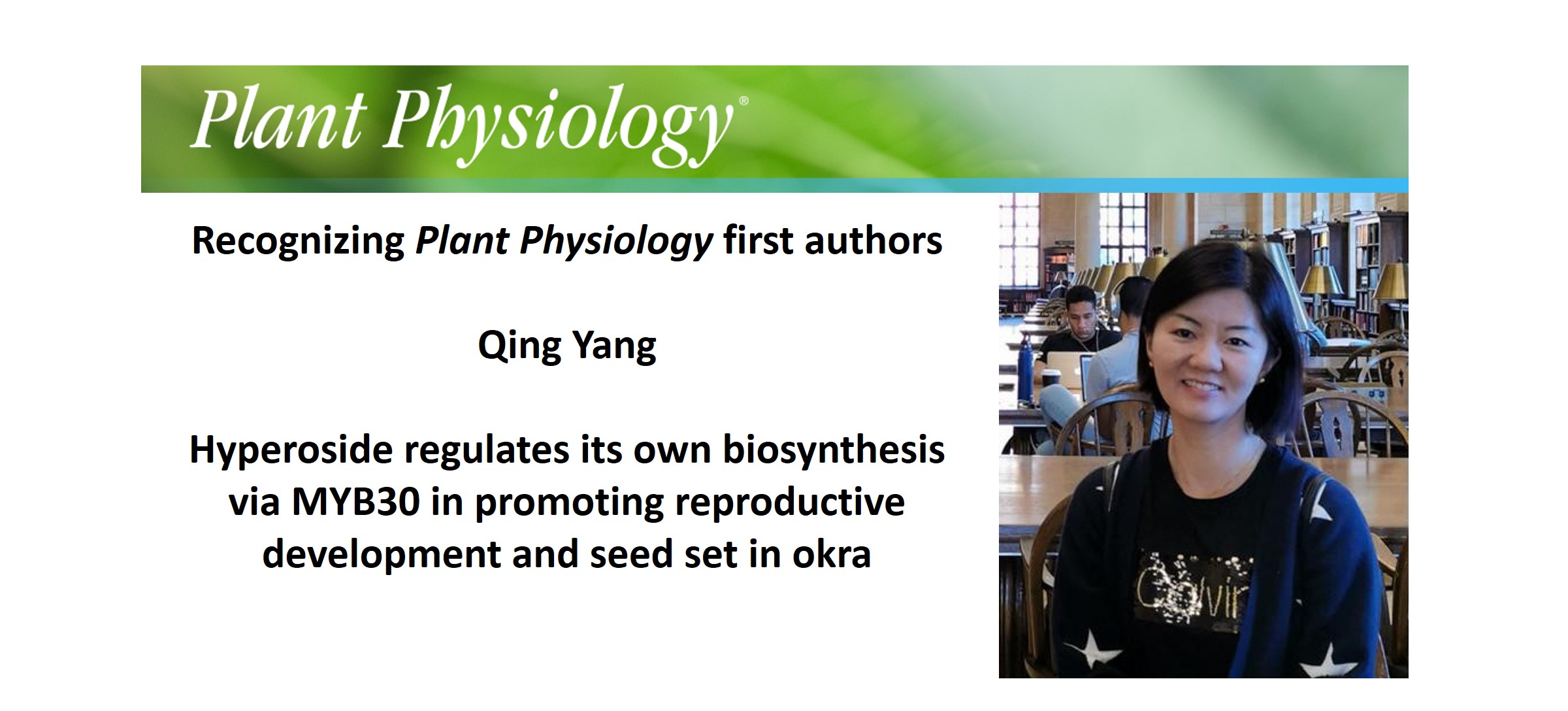Recognizing Plant Physiology authors: Qing Yang
Qing Yang, first author of Hyperoside regulates its own biosynthesis via MYB30 in promoting reproductive development and seed set in okra
Current Position: Associate Professor at the College of Forestry and Beijing Advanced Innovation Center for Tree Breeding by Molecular Design, Beijing Forestry University, Beijing, China
Education: From 2005 to 2018, I continuously got undergraduate, masters and PhD degrees in Agronomy and Biotechnology College, China Agricultural University, Beijing, China
Non-scientific Interests: reading, travelling
Brief bio: I joined the lab of Prof. Yujie Fu and Prof. Dong Meng at the College of Forestry and Beijing Advanced Innovation Center for Tree Breeding by Molecular Design, Beijing Forestry University after PhD in 2018 as a Associate Professor. My main focus was studying the mechanisms molecular regulation of secondary metabolites and establishment of genetic transformation system of perennial economic trees, especially on the regulation of flowering and reproductive development. The pollen tube was used as the main cytological system in the study of molecular genetics, biochemistry and cell biology. The aim of my research is to reveal the relationship between the secondary metabolites and structure of cytoskeleton and regulatory mechanism of cell polar growth in forest plant resources.
In this study, we concluded this simple way of hyperoside application could provide a favorable theoretical basis for the development and utilization of medical and edible plants based on the physiological components and molecular biological mechanism. In our earlier work, it was found hyperoside served as a signal prolonging the blooming period of okra flowers (Qing Y., et al., AeCDPK6 phosphorylates and stabilizes AeMYB30 promoting hyperoside biosynthesis to prolong full-blooming period in okra, Journal of Experimental Botany, 2020, https://doi.org/10.1093/jxb/eraa174 ). This study is a follow-up work and the first time concerning about hyperoside acts as a accelerator to improve seed set rate by promoting pollination and fertilization.
姓名:杨清
目前职位:北京林业大学林学院和林木分子设计育种高精尖创新中心,副教授
教育背景:2005年-2018年在中国农业大学连续就读本科,硕士,博士。
兴趣爱好:阅读,旅游
个人研究简介:我于2018年在中国农业大学博士毕业后加入北京林业大学林业学院和北京林木分子设计育种先进创新中心的付玉杰教授和孟冬教授的实验室,任副教授。主要研究多年生经济林木次生代谢产物的分子调控机制和遗传转化体系的建立,特别是开花和生殖发育的调控。花粉管是分子遗传学、生物化学和细胞生物学研究的主要细胞学系统。 我的研究旨在揭示森林植物次生代谢产物与细胞骨架结构的关系,以及细胞极性生长的调控机制。
本研究从黄酮类次生代谢产物金丝桃苷的分子生物合成和调控机制出发,为药用和食用植物的开发利用提供了良好的理论依据。在我们之前的研究中,我们发现金丝桃苷是延长秋葵(金花葵)花期的信号(Qing Y.等人,AeCDPK6磷酸化并稳定AEMEB30促进金丝桃苷生物合成以延长其有效花期,《Journal of Experimental Botany》,2020年,https://doi.org/10.1093/jxb/eraa174)。 本研究为后续工作,首次探讨金丝桃苷作为小分子次生代谢产物作为一种信号物质,促进授粉受精最终提高结实率的机制。




